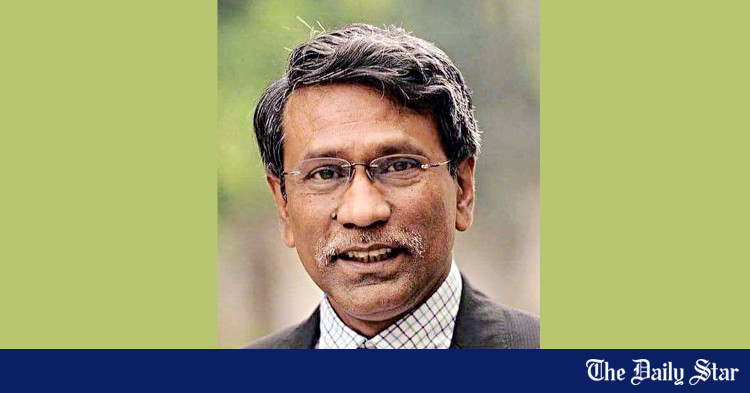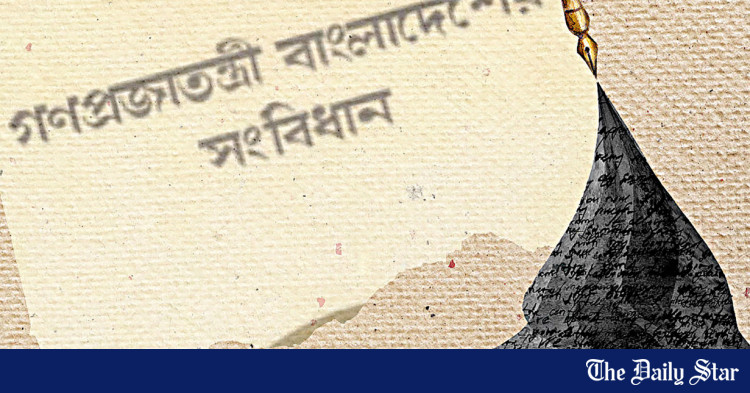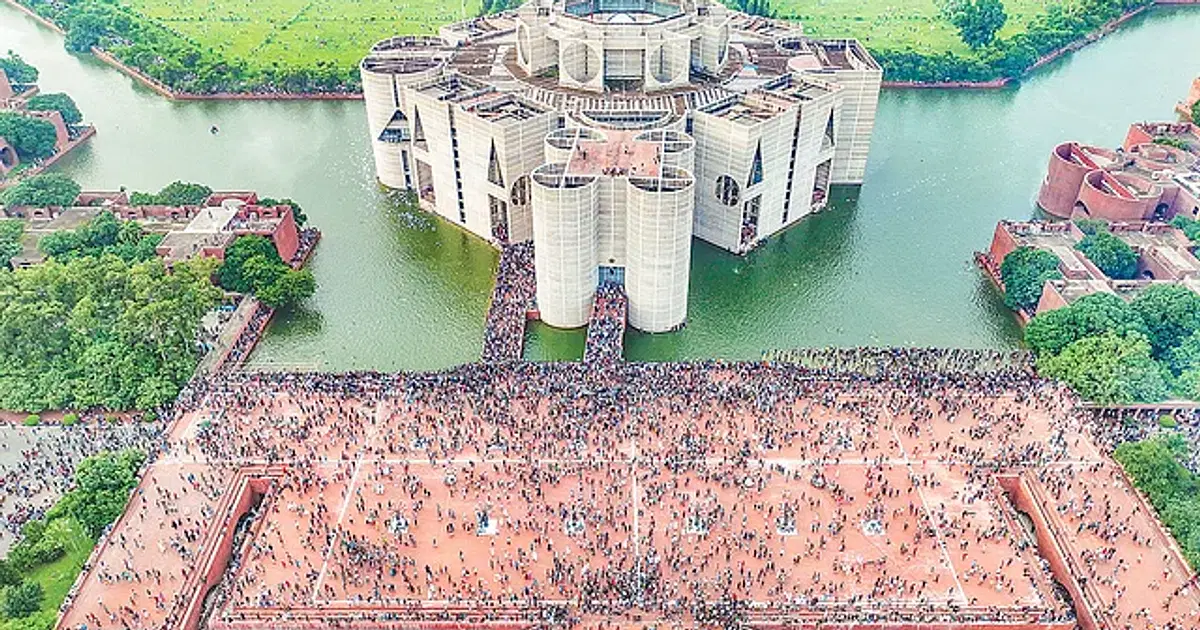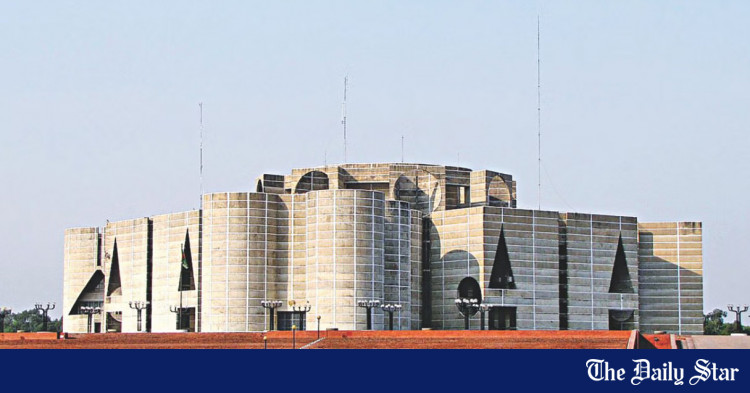What is constitutional reform, how this to be carried out?
Ridwanul Haque
Updated: 06 Nov 2024, 16: 44
After the successful revolution of July-August, public gathering in the National Parliament. They are now facing a new Bangladesh on 5 August.Shuvra Kanti Das
The Constitution Reform Commission, formed on 6 October, will provide necessary recommendations for constitutional reforms after reviewing and evaluating the existing constitution, according to a gazette issued by the government. So the commission does not have the authority to draft a new constitution.
The process for constitutional reform – whether through a new constitution or amendments – has not been decided yet. However, one of the main coordinators of the Students Against Discrimination (SAD) has already presented a five-point demand for state reform. Their first demand is to abolish the 1972 constitution and draft a new one.
With a few exceptions, the power and authority to create a new constitution lies with the constituent assembly or a constitution council. The power to amend the constitution rests with parliament. The 1972 constitution chose the parliamentary democracy system as the method of governance for the state.
The people were recognised as the ultimate source of power. The four fundamental principles - democracy, socialism, Bengali nationalism, and secularism - were established as the constitutional identity. The constitution safeguards the fundamental human rights of citizens and grants the High Court the power to enforce these rights.
The journey of the constitution, which promised a bright future, faltered within two years. In January 1975, through the Fourth Amendment, a one-party BAKSAL system was established. A presidential system, characterised by strong authoritarian rule, was introduced overnight. Freedom of speech, press freedom, and citizens’ rights were suspended, and the judiciary became subordinate to the president.
Was this significant change or constitutional decline a result of the weaknesses of the 1972 constitution? I believe this change was made possible by certain constitutional and extra-constitutional factors.
First, then prime minister Sheikh Mujibur Rahman misused his charismatic leadership.
Second, parliament abused its power to amend the constitution due to its majority.
Third, article 142, which outlines the process for constitutional amendments, was flawed. In that system, there was no provision for a referendum or broad public consultation before amending the constitution’s fundamental principles.
Fourth, article 70, which imposes restrictions on voting against one's party, prevented the rise of opposition voices in parliament.
Fifth, there was no democracy within the ruling party, and the “one leader, one nation” mentality encouraged nepotism in governance.
Less than seven months after the four amendments, Sheikh Mujibur Rahman and his family were brutally assassinated on 15 August 1975. From then until 6 December 1990, military governments ruled the country. During this period, the state was governed by a presidential system.
Between 1975 and 1990, some hopeful reforms were made to the constitution and the constitutional system. Although democracy was absent and elections were controlled and manipulated by the governing party, key reforms included giving various political parties space to engage in politics, and the formation of the BNP and Jatiya Party, which led to political competition.
Another significant change was the alteration and revision of the four fundamental principles. Instead of Bengali nationalism, Bangladeshi nationalism was introduced, which made indigenous and non-Bengali communities feel more at ease. Although controversial, the recognition of Islam as the state religion, replacing secularism, satisfied Islamist parties. However, the ruling elite made these changes primarily to serve their political interests.
Another notable reform was the introduction of a referendum for amendments to the constitution, including those concerning the form of government and other key principles.
The political plurality that emerged during this time led to the popular anti-authoritarian movement, which forced president Ershad to resign in December 1990. This culminated in the establishment of a democratic government through free and fair elections under the leadership of the interim president Shahabuddin Ahmed in February 1991. The BNP formed the government, and the Awami League emerged as a strong opposition.
In a historic and unique moment in the country's politics, all political parties agreed to reinstate the parliamentary system of governance through the 12th Amendment. This amendment also retained the provision for a referendum on constitutional amendments, albeit with some modifications.
Unfortunately, despite the promising restoration of democracy in 1991, the BNP government, towards the end of its tenure, began to manipulate the electoral system in an effort to regain power. Eventually, due to the strong stance, struggle, and firm demands of the Awami League, the BNP established a caretaker government system through the 13th Amendment.
In the 1996 elections held under this caretaker system, the Awami League won and formed the government. After the end of that government’s term, another caretaker government oversaw the 2001 elections, in which the BNP returned to power.
The next election, originally scheduled for 2006, faced complications when the BNP increased the retirement age for Supreme Court judges through the 14th Amendment. Their intention was to appoint the most senior judge, justice KM Hasan, as head of the caretaker government. The Awami League opposed this, resulting in a new political crisis.
With indirect military intervention, a caretaker government was formed. This government, which stayed in power for two years instead of the constitutionally prescribed 90 days, held parliamentary elections in December 2008. In those elections, the Awami League won by a landslide and formed the government.
From the 1991, 2001, 2006, and 2008 elections, we observed that the BNP and the Awami League alternated in power, with neither party serving two consecutive terms. After the 2008 elections, the Awami League formed the government in January 2009. Over time, prime minister Sheikh Hasina began influencing and corrupting the democratic and constitutional institutions.
Ridwanul Haque
At one point, the Awami League with an evil design unilaterally abolished the caretaker system from the constitution in 2011. This was done under pressure from the courts, which had ruled against it, and with the backing of the then chief justice, who was reportedly involved in a self-serving conspiracy. In 2010, the Supreme Court’s Appellate Division declared the caretaker government system unconstitutional, with a 4-3 verdict.
Predictably, the BNP boycotted the 2014 elections, and the Awami League formed a government through a largely unopposed, one-sided election. No opposition parties were present in Parliament, and the Jatiya Party was coerced into participating, later joining the government as a partner.
The country essentially returned to a one-party system without changing the constitution. Over the past decade and a half, Sheikh Hasina became an authoritarian leader, consolidating power through patronage networks in the party, administration, police, and other state institutions. This led to massive corruption, especially in political, financial, and constitutional areas.
The elections of 2014, 2018, and 2024 were marred by fraud, looting, and manipulation, destroying the electoral system. In the 2018 elections, the BNP was left with only 6-7 seats. Opposition parties were silenced through repression, disappearances, and killings, while millions of crores of public money were siphoned off through corrupt business networks. Like any autocrat who becomes crazy to stay in power, the ruling party Awami League, the police and the administrative officials were indulged in unlimited corruption at all levels.
In such a context, the country saw the appointment of a former officer from the controversial S Alam Group as President, who had previously served as a commissioner in the Anti-Corruption Commission.
This system is inconsistent and contradictory. In practice, neither the prime minister nor the cabinet is accountable to parliament. Judicial power lies with the judiciary, and legislative power resides in parliament, so the executive power should not be concentrated in a single individual.
In a democratic system, the prime minister holds the highest position among the executive leaders. Our current constitution deviates from this principle. Moreover, there is no limit on how many terms a person can serve as the prime minister. During the adoption of the 1972 constitution, discussions had taken place on this matter, and senior members considered the parliamentary power to remove a prime minister through a no-confidence vote as a safeguard against authoritarianism.
However, it is well-known that in our political culture, parliament lacks the opportunity to become a powerful institution. Key reasons for this include article 70, lack of internal democracy within political parties, and clan-based party politics. Another major flaw is that the constitution did not establish binding rules for political parties.
Article 70's restrictions on MPs voting freely must be abolished to ensure political pluralism and empower parliament. Two key reforms are urgently needed to ensure executive accountability and parliament’s empowerment: 1) A limit on the number of terms a prime minister can serve, and 2) Reducing parliament's term from five to four years. Additionally, the independence of the judiciary should be ensured by democratising the appointment and removal of judges and embedding this process in the constitution.
There is an important and different issue concerning the current constitution's weakness, which needs addressing: Bengali nationalism. Bengali nationalism is an authoritarian concept and is contrary to inclusive democracy and constitutionalism. The 1972 constitution failed to recognize indigenous and non-Bengali communities and excluded them from the constitutional definition of the people. The armed struggles in the Chittagong Hill Tracts in the 1970s were a direct consequence of this constitutional exclusion.
Many argue that there was no balance of power between the president and prime minister. I disagree with this opinion. In a parliamentary system, there is no need for a balance of power between the president and the prime minister. The real issue is the lack of balance of power between the legislature, executive, and judiciary. Under the current constitution, the judiciary cannot exercise its power independently, and the appointment of judges is controlled by the government. Over the years, we have witnessed the government's influence over the appointment and removal of judges.
There is no doubt that certain inherent weaknesses in the constitution have helped the prime minister become increasingly authoritarian. However, a comparison between the past 15 years of the Awami League government and the post-1990 Awami League and BNP governments presents a different picture. Under the same constitution, the government of Sheikh Hasina from 1996 to 2001 was not authoritarian. After being democratically elected in 2009, it was only after a couple of years that Sheikh Hasina gradually steered Bangladesh towards authoritarianism. The flaws in the amendment process of the constitution, which were present in the original document, were first addressed during Zia's time and later through the 12th Amendment, based on political unity.
Certain provisions of the constitution, particularly the requirement for a referendum for amendments (Article 142), were initially established. However, the Awami League government ignored this and, through the 15th Amendment, illegally altered or abolished fundamental provisions of the constitution, most notably the abolition of the caretaker government system, which amounted to a form of constitutional deception.
It wasn't just the Awami League; the BNP had also amended the constitution to serve its own interests and to undermine its opponents. Therefore, the process of constitutional amendments should be critically examined.
The current demand for a new constitution does not provide any clarity on the method. I do not believe a new constitution can be created without forming a Constituent Assembly. My reasoning for this stance is that the force and rationale behind the revolution of July (2024) is different from the force and cause of the 1971 liberation war.
After the great Liberation War of 1971, Bangladesh adopted its constitution through a Constituent Assembly (not a parliament) formed through free and fair elections. The Proclamation of Independence issued by the Constituent Assembly before the constitution came into effect on 16 December 1972, served as the temporary constitution. That constitutional assembly was formed on the basis of election.
In the current political context, if we are to create a new constitution or amend the existing one for constitutional reforms, we must move towards a broader political consensus. Political parties are essential for constitutional politics and governance. They represent the 'constitutional people' or citizens and act as agents of the people. Political parties are the foundation of democracy, and they provide the means for the people's participation in state affairs.
Therefore, in the interest of sustainable constitutional reforms, all political parties must reach a minimal consensus on two key issues: First, what reforms do they want in the constitution? Second, what method should be followed for those reforms—whether to create a new constitution or amend the existing one?
The Students Against Discrimination could play a role in encouraging and bringing political parties together. If all parties unite, a constitutional council could be formed before the next elections to begin the process of reform.
After the July revolution, we, as a nation, have truly arrived at a unique constitutional moment. This revolution, a people's uprising, is distinct from other popular movements or uprisings in post-1971 Bangladesh. However, everyone involved must remember that any constitution will only work when all the forces within society, all stakeholders, and institutions accept and abide by it. This is why we must rely on political parties and other political-social forces, and ensure the democratisation of political parties. The people must take their rightful role as the ultimate holders of state power—not as servants or subordinates of political parties or the ruling authorities.
* Ridwanul Haque: Associate Dean at a higher education institution in Melbourne; former Professor at the Department of Law, University of Dhaka.
** This article has been rewritten in English by Rabiul Islam














































